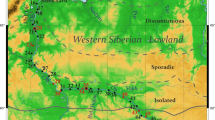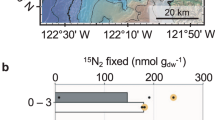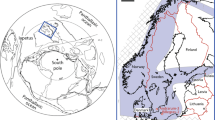Abstract
Dissolved organic matter (DOM) in seawater represents one of the largest active carbon reservoirs on Earth1. Although mass-balance calculations suggest a substantial riverine input to the marine DOM pool2, a terrestrial organic component has not been positively identified in open-ocean water. By using lignin-derived phenols as molecular-level probes of DOM (analogous to previous studies in sediments3–5), we report here the first unambiguous evidence for the presence of terrestrially derived DOM in open ocean water. Dissolved humic substances, isolated by resin adsorption from near-surface water of the eastern equatorial Pacific, yield lignin-derived phenols in compositional patterns which resemble those obtained from Amazon River water6,7. Total phenol yields from these open-ocean humic isolates are, on average, ∼10% of those from Amazon humic substances, indicating that ∼10% of dissolved marine humic material (and at least 0.5% of the bulk marine DOM) is terrestrially derived.
This is a preview of subscription content, access via your institution
Access options
Subscribe to this journal
Receive 51 print issues and online access
$199.00 per year
only $3.90 per issue
Buy this article
- Purchase on Springer Link
- Instant access to full article PDF
Prices may be subject to local taxes which are calculated during checkout
Similar content being viewed by others
References
Likens, G. E., Bormann, F. H. & Johnson, N. M. in Some Perspectives of the Major Biogeochemical Cycles—Scope 17 (ed. Likens, G. E.) 93–112 (Wiley, New York, 1981).
Meybeck, M. Am. J. Sci. 282, 401–450 (1982).
Hedges, J. I. & Parker, P. L. Geochim. cosmochim. Acta 40, 1019–1029 (1976).
Hedges, J. I. & Mann, D. C. Geochim. cosmochim. Acta 43, 1809–1818 (1979).
Ertel, J. R. & Hedges, J. I. Geochim. cosmochim. Acta 48, 2065–2074 (1984).
Ertel, J. R. thesis, Univ. Washington (1985).
Ertel, J. R., Hedges, J. I., Devol, A. H., Richey, J. E. & Ribeiro, N. Limnol. Oceanogr. (in the press).
Williams, P. M., Oeschger, H. & Kinney, P. Nature 224, 256–259 (1969).
Mantoura, R. F. C. & Woodward, E. M. S. Geochim. cosmochim. Acta 47, 1293–1309 (1983).
Pempkowiak, J. & Pocklington, R. in Aquatic and Terrestrial Humic Materials (eds Christman, R. F. & Gjessing, E. T.) 371–386 (Ann Arbor Science, Ann Arbor, 1983).
Lee, C. & Bada, J. L. Earth planet. Sci. Lett. 26, 61–68 (1975).
Gagosian, R. B. Geochim. cosmochim. Acta 39, 1443–1454 (1975).
Mopper, K. Mar. Chem. 5, 585–603 (1977).
Thurman, E. M. in Organic Geochemistry of Natural Waters (eds Kramer, C. J. M. & Duinker, J. C.) (Martinus Nijhoff/Dr W. Junk, Dordrecht, 1985).
Stuermer, D. H. & Harvey, G. R. Nature 250, 480–481 (1976).
Gagosian, R. B. & Stuermer, D. H. Mar. Chem. 5, 605–632 (1977).
Harvey, G. R., Boran, D. A., Chesal, L. A. & Tokar, J. M. Mar. Chem. 12, 119–132 (1983).
Stuermer, D. H. & Payne, J. R. Geochim. cosmochim. Acta 40, 1109–1114 (1976).
Wilson, M. A., Philp, R. P., Gillam, A. H., Gilbert, T. D. & Tate, K. R. Geochim. cosmochim. Acta 47, 497–502 (1983).
Sarkanen, K. V. & Ludwig, C. H. (eds) Lignins (Wiley, New York, 1971).
Crawford, R. L. (ed.) Lignin Biodegradation and Transformation (Wiley, New York, 1981).
Ertel, J. R., Hedges, J. I. & Perdue, E. M. Science 223, 485–487 (1984).
Hedges, J. I., Ertel, J. R. & Leopold, E. B. Geochim. cosmochim. Acta 46, 1869–1877 (1982).
Thurman, E. M. & Malcolm, R. L. Envir. Sci. Technol. 15, 463–466 (1981).
Degens, E. T. in Organic Geochemistry (eds Eglinton, G. & Murphy, M. T. J.) 304–329 (Springer, New York, 1969).
Hedges, J. I. & Ertel, J. R. Analyt. Chem. 54, 174–178 (1982).
Horning, M. G., Moss, A. M. & Horning, E. C. Analyt. Biochem. 22, 284 (1968).
Gillam, A. H. & Wilson, M. A. Org. Geochem. 8, 15–25 (1985).
Eadie, B. J., Jeffrey, L. M. & Sackett, W. M. Geochim. cosmochim. Acta 42, 1265–1269 (1978).
Williams, P. M. & Gordan, L. Deep Sea Res. 17, 19–27 (1970).
Author information
Authors and Affiliations
Rights and permissions
About this article
Cite this article
Meyers-Schulte, K., Hedges, J. Molecular evidence for a terrestrial component of organic matter dissolved in ocean water. Nature 321, 61–63 (1986). https://doi.org/10.1038/321061a0
Received:
Accepted:
Issue Date:
DOI: https://doi.org/10.1038/321061a0
This article is cited by
-
Universal microbial reworking of dissolved organic matter along environmental gradients
Nature Communications (2024)
-
Marine dissolved organic matter: a vast and unexplored molecular space
Applied Microbiology and Biotechnology (2021)
-
Unified concepts for understanding and modelling turnover of dissolved organic matter from freshwaters to the ocean: the UniDOM model
Biogeochemistry (2019)
-
Comparison between humic-like peaks in excitation-emission matrix spectra and resin-fractionated humic substances in aquatic environments
Limnology (2019)
-
Universal molecular structures in natural dissolved organic matter
Nature Communications (2018)
Comments
By submitting a comment you agree to abide by our Terms and Community Guidelines. If you find something abusive or that does not comply with our terms or guidelines please flag it as inappropriate.



